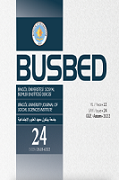ÜNİVERSİTE ÖĞRENCİLERİNDE AKADEMİK ÖZYETERLİĞİN YORDAYICILARI OLARAK AKADEMİK MOTİVASYON, SOSYAL BAĞLILIK VE ERTELEME EĞİLİMİ
ACADEMIC MOTIVATION, SOCIAL COMMITMENT AND PROCRASTINATION TENDENCY AS PREDICTORS OF ACADEMIC SELF-EFFICACY IN UNIVERSITY STUDENTS
Author(s): Nesip Demirbilek, Ferhat HanSubject(s): Education, Sociology, Higher Education
Published by: Bingöl Üniversitesi Sosyal Bilimler Enstitüsü
Keywords: Academic Self-Efficacy; Academic Motivation; Social Commitment; Procrastination Tendency;
Summary/Abstract: The aim of the study is to determine the academic self-efficacy, academic motivation, social commitment, and procrastination levels of university students. Relational survey model, one of the quantitative research methods, was used in the research. The universe of the research consists of university students studying at the Faculty of Arts and Sciences at Bingöl University in the 2019-2020 academic year with distance education. The sample of the study was determined by the convenient sampling method, which is one of the non-random sampling methods. In this study, scales were sent to the e-mail addresses of all students studying at the Faculty of Arts and Sciences. 546 students voluntarily participated in the study. As a result of the research, it was determined that the students' academic self-efficacy levels were above the average, their academic motivation levels were moderate, their social commitment levels were below the average, and their procrastination tendencies were moderate. A positive, low-level meaningful relationship was found between students' academic self-efficacy and academic motivation levels. Academic motivation is an important predictor of academic self-efficacy perception. Academic motivation explains about 6% of the variance in students' academic self-efficacy. A positive, lowlevel meaningful relationship was found between students' academic motivation levels and social commitment levels. Academic motivation and social commitment variables together explain 11% of the variance regarding the perception of academic self-efficacy. A low-level significant positive correlation was found between the level of academic motivation and the level of procrastination. A negative, low-level meaningful relationship was found between the level of academic self-efficacy and the level of social commitment. There was a positive and low-level meaningful relationship between students' social commitment levels and procrastination levels. No meaningful relationship was found between students' academic self-efficacy perceptions and procrastination tendencies. Our findings suggest that the prevention and reduction of academic procrastination should be part of a comprehensive educational approach.
Journal: Bingöl Üniversitesi Sosyal Bilimler Enstitüsü Dergisi (BUSBED)
- Issue Year: 12/2022
- Issue No: 24
- Page Range: 311-324
- Page Count: 14
- Language: Turkish

